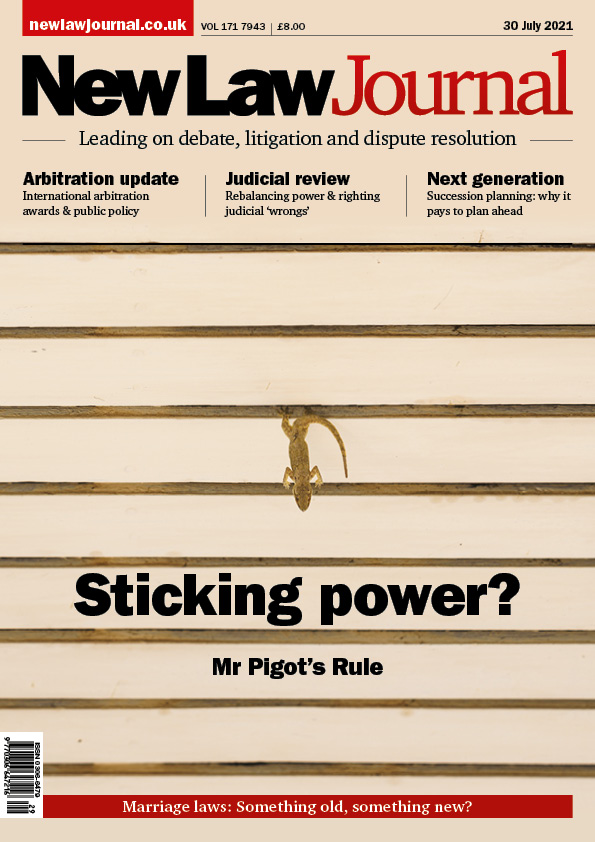THIS ISSUE

How much of a concern is the government’s Judicial Review and Courts Bill? Some people expected worse. Others think the Bill is a big enough threat as it is
It was viewed as government retaliation for various judicial decisions in recent years, and was ‘awaited with trepidation’ but ‘far from revolutionary’ when it arrived
It’s wedding season and loved-up couples around the country are busy organising COVID-compliant ceremonies and celebrations
A change in the wording of equality legislation has not altered the burden of proof in discrimination claims, the Supreme Court has unanimously held
The Supreme Court has called on Parliament to address a ‘serious lacuna’ in the law on solicitors' undertakings, in a case concerning rival law firms involved in the Volkswagen emissions legal action
MPs have called for ‘urgent’ reform to civil and criminal legal aid, in a Justice Committee report
The Lord Chancellor, Robert Buckland has called for more CILEX (Chartered institute of Legal Executives) judges
The majority of law firms are making increasing use of technology, although funding and scalability issues mean the development of bespoke tech is mainly aimed at helping large corporate clients, an Oxford University study into innovation in lawtech has found
Some 60 Crown Court rooms will reopen by September, while 32 Nightingale Court rooms will have their leases extended to April 2022 to tackle the backlog of cases, the Lord Chancellor, Robert Buckland has announced
The government has introduced its Judicial review and Courts Bill to parliament, to widespread dismay among lawyers
MOVERS & SHAKERS

NLJ Career Profile: Ken Fowlie, Stowe Family Law
Ken Fowlie, chairman of Stowe Family Law, reflects on more than 30 years in legal services after ‘falling into law’

Gardner Leader—Michelle Morgan & Catherine Morris
Regional law firm expands employment team with partner and senior associate hires

Freeths—Carly Harwood & Tom Newton
Nottinghamtrusts, estates and tax team welcomes two senior associates
NEWS
Children can claim for ‘lost years’ damages in personal injury cases, the Supreme Court has held in a landmark judgment
Holiday lets may promise easy returns, but restrictive covenants can swiftly scupper plans. Writing in NLJ this week, Andrew Francis of Serle Court recounts how covenants limiting use to a ‘private dwelling house’ or ‘private residence’ have repeatedly defeated short-term letting schemes
Artificial intelligence (AI) is already embedded in the civil courts, but regulation lags behind practice. Writing in NLJ this week, Ben Roe of Baker McKenzie charts a landscape where AI assists with transcription, case management and document handling, yet raises acute concerns over evidence, advocacy and even judgment-writing
The Supreme Court has drawn a firm line under branding creativity in regulated markets. In Dairy UK Ltd v Oatly AB, it ruled that Oatly’s ‘post-milk generation’ trade mark unlawfully deployed a protected dairy designation. In NLJ this week, Asima Rana of DWF explains that the court prioritised ‘regulatory clarity over creative branding choices’, holding that ‘designation’ extends beyond product names to marketing slogans
From cat fouling to Part 36 brinkmanship, the latest 'Civil way' round-up is a reminder that procedural skirmishes can have sharp teeth. NLJ columnist Stephen Gold ranges across recent decisions with his customary wit








